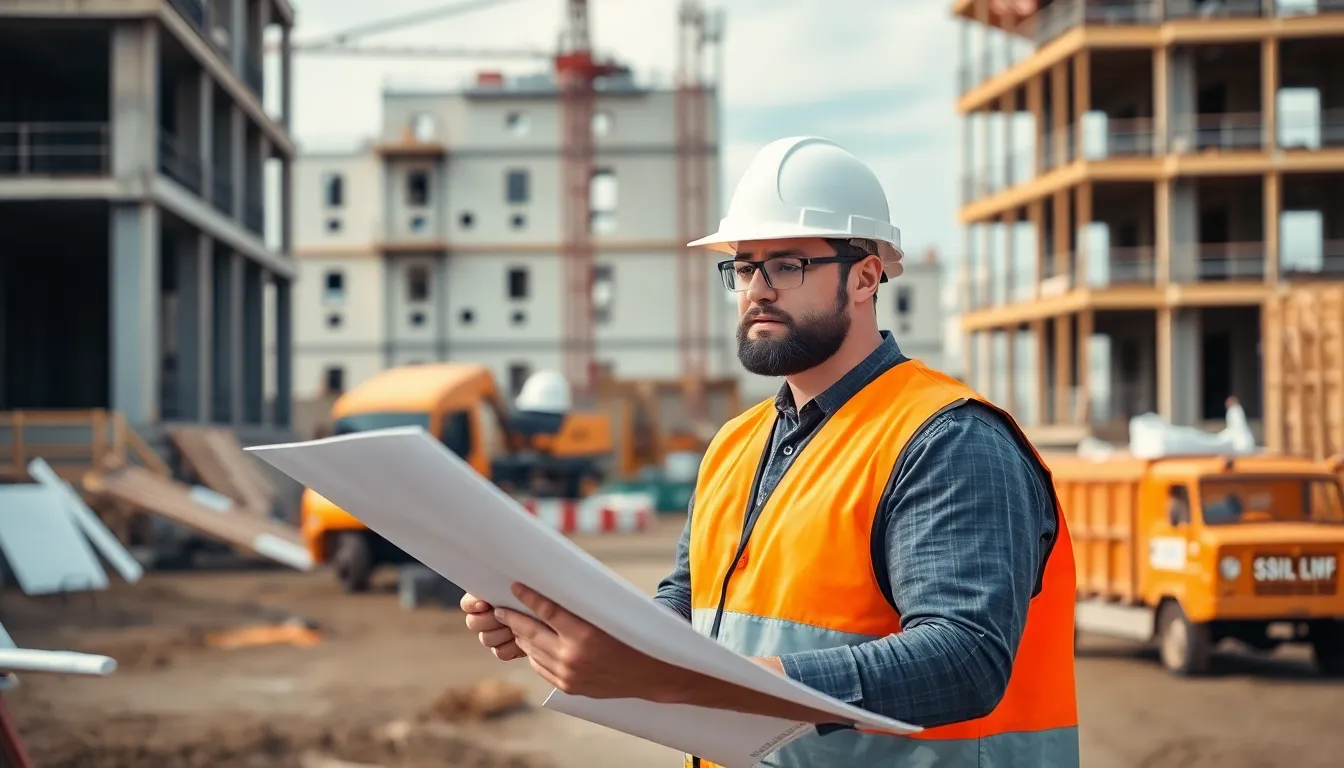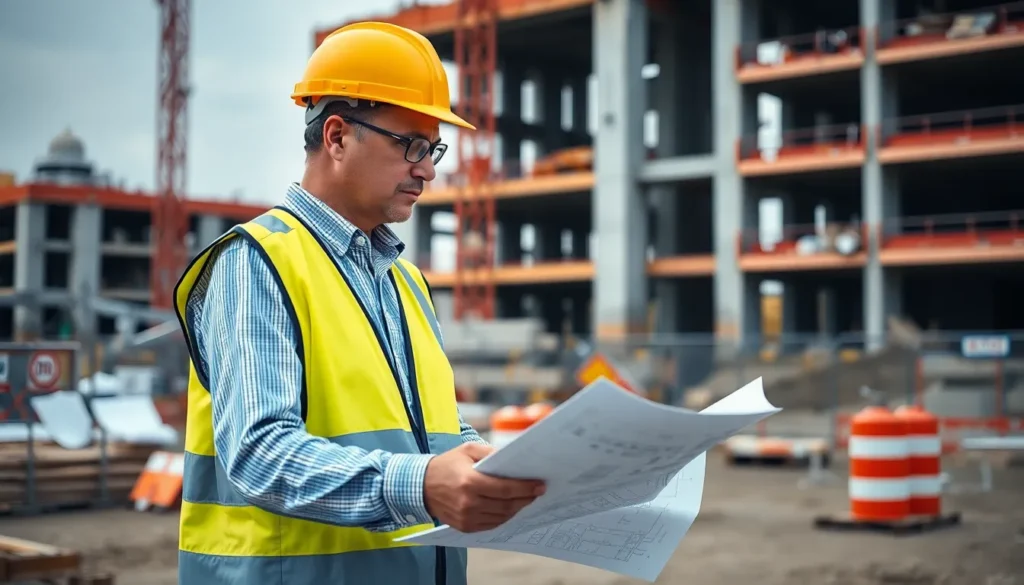In the bustling world of construction, where dreams take shape and blueprints become reality, there’s a group of unsung heroes ensuring everything stays on the straight and narrow: construction and building inspectors. Think of them as the friendly neighborhood watchdogs, armed with hard hats and a keen eye for detail, ready to swoop in before a rogue wall decides to play hide and seek.
These professionals don’t just check off boxes; they’re the guardians of safety, quality, and compliance. Without them, your dream home could end up being a real-life version of a DIY disaster. So, let’s dive into the fascinating world of building inspectors, where every nail counts and a level is more than just a tool—it’s a way of life. Whether you’re a seasoned builder or a curious homeowner, understanding their role could save you from some serious headaches down the road.
Table of Contents
ToggleOverview of Construction and Building Inspectors
Construction and building inspectors play a crucial role in ensuring safety and compliance throughout the building process. They assess building projects at various stages, focusing on key elements such as structural integrity, electrical systems, plumbing, and fire safety. Regulations require inspections at different milestones, ensuring that projects adhere to local codes and standards.
Inspectors possess a deep understanding of construction practices, materials, and relevant laws. Familiarity with building codes allows them to identify violations promptly, minimizing risks associated with non-compliance. Many inspectors hold certifications from recognized organizations, demonstrating their expertise and commitment to the profession.
Communication skills are vital for inspectors. They interact with builders, contractors, and property owners, providing clear explanations of findings and necessary corrective actions. Strong relationships often develop between inspectors and building teams, enhancing cooperation and project efficiency.
Documentation of inspections is essential. Inspectors maintain detailed records, which serve as a reference for future projects and compliance checks. This thorough approach contributes to quality assurance and accountability within the construction industry.
In some cases, inspectors may also conduct follow-up visits to ensure compliance with previous recommendations. While the role can be challenging, it remains rewarding, as inspectors contribute significantly to the safety and integrity of buildings. Their vigilance prevents potential issues and fosters trust among all stakeholders in the construction process.
Roles and Responsibilities

Construction and building inspectors play a crucial role in maintaining safety and quality in construction projects. Their responsibilities cover various aspects of the building process.
Conducting Inspections
Inspectors evaluate work at multiple stages throughout a project. They focus on key elements such as structural integrity, electrical systems, plumbing, and fire safety. Inspections occur at critical checkpoints to ensure compliance with local building codes. They identify potential issues before they escalate, protecting both builders and homeowners. Immediate corrective actions often arise from their findings, fostering safer environments.
Reviewing Plans and Specifications
Inspectors analyze construction plans and specifications before work begins. This review process ensures that designs align with local codes and regulations. Findings during this phase guide the construction team, minimizing costly revisions later. Communication with architects and engineers helps address any potential discrepancies early. Constructive feedback often enhances the overall project quality while ensuring all stakeholders remain informed.
Ensuring Compliance with Codes
Compliance with building codes is a top priority for inspectors. They verify that all construction practices adhere to established safety regulations and standards. Regular assessments reveal any violations that must be remedied promptly. Detailed documentation supports their evaluations, providing a clear record of compliance. By enforcing these codes, inspectors safeguard the public and contribute to the integrity of the construction industry.
Qualifications and Training
Construction and building inspectors require a solid foundation of education and training to perform their critical roles effectively. Their qualifications often include formal education and specialized training programs.
Educational Background
Most inspectors hold an associate’s degree or higher in fields like construction management or civil engineering. Courses in building codes, structural design, and safety regulations provide essential knowledge. Some states allow a high school diploma combined with extensive on-the-job training as an alternative. Specialized programs at technical colleges may enhance learning about construction practices and safety protocols. Practical experience, such as internships, often strengthens their understanding of real-world applications.
Certification and Licensing
Certification demonstrates inspectors’ proficiency and commitment to industry standards. Numerous organizations, such as the International Code Council (ICC) and National Association of Home Inspectors (NAHI), offer recognized certifications. Inspectors usually need to pass exams covering specific subjects related to building codes and inspection practices. Licensing requirements vary by state; many require continuous education to maintain credentials. Having valid certifications and licenses establishes trust and credibility in the construction industry.
Tools and Technology Used
Construction and building inspectors rely on a variety of tools and technologies to ensure projects meet safety standards and regulations.
Inspection Tools and Equipment
Inspectors utilize various handheld tools for accurate assessments. Levels verify structural alignment, while tape measures allow for precise measurements. Thermal imaging cameras help detect heat loss and moisture issues in buildings. Additionally, moisture meters assess humidity levels within materials. Drones provide aerial views of hard-to-reach areas, enhancing inspection efficiency. These tools contribute to thorough evaluations of construction projects.
Software for Inspection Management
Inspection management software streamlines the documentation process for inspectors. Programs often include features for scheduling inspections, tracking compliance with building codes, and generating reports. Some platforms enable photo uploads and annotation, enhancing communication with builders and homeowners. Data analytics play a crucial role in identifying trends and areas for improvement. Utilizing software increases efficiency and accuracy in inspection management, ultimately supporting the integrity of construction practices.
Challenges Faced by Inspectors
Inspectors encounter various challenges throughout the construction process. Complex projects often present obstacles that complicate their duties.
Common Issues in Construction
Frequent problems that arise include inconsistent workmanship and inadequate materials. Builders may overlook quality standards, leading to structural safety concerns. Additionally, weather-related delays can impact timelines, causing inspectors to reschedule evaluations. Tight budgets sometimes result in shortcuts that compromise safety measures. These issues necessitate inspectors to be vigilant in identifying potential hazards early. Inadequate communication among contractors can also complicate inspections, making clarity essential for successful project management.
Dealing with Code Violations
Code violations present significant challenges during inspections. Inspectors must remain knowledgeable about ever-evolving regulations and building codes. Poor record-keeping often complicates the documentation of violations, making enforcement difficult. When violations are identified, inspectors communicate findings clearly to builders and property owners, facilitating resolutions. Continuous education keeps inspectors updated on legal requirements, ensuring compliance remains a priority. Follow-up inspections frequently occur to confirm corrective actions have been implemented, safeguarding public safety in construction practices.
Construction and building inspectors are integral to the success of any construction project. Their expertise not only ensures compliance with safety standards but also protects the interests of builders and homeowners alike. By identifying potential issues early and maintaining clear communication, inspectors foster a collaborative environment that promotes quality and trust.
As the construction industry continues to evolve, the role of inspectors will remain crucial in navigating complexities and upholding safety. Their commitment to continuous education and use of advanced technology ensures they stay at the forefront of industry standards. Recognizing and valuing the contributions of these professionals can lead to safer and more successful building practices for everyone involved.



